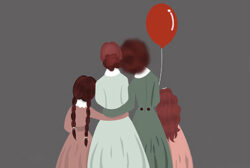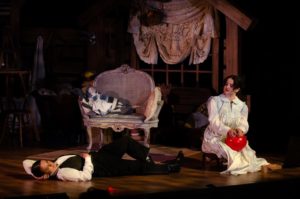
 [rating=2]I read Louisa May Alcott’s “Little Women” when I was ten years old and have seen several versions of the movie. So I can tell that First Folio Theatre’s production is largely true to the classic novel about the four young March sisters and how they each come into their own. This book was the precursor of modern era, where women with differing ambitions, personalities, and interests learn that, despite obstacles, they can become anything that they want to be: if they imagine it, work hard enough, and get a kind, open, and honest man to be supportive. The problem, however, is that the current production often loses sight of the main point of the story and thus falls short in many ways. When the characters don’t seem realistic or believable enough, we lose interest in them.
[rating=2]I read Louisa May Alcott’s “Little Women” when I was ten years old and have seen several versions of the movie. So I can tell that First Folio Theatre’s production is largely true to the classic novel about the four young March sisters and how they each come into their own. This book was the precursor of modern era, where women with differing ambitions, personalities, and interests learn that, despite obstacles, they can become anything that they want to be: if they imagine it, work hard enough, and get a kind, open, and honest man to be supportive. The problem, however, is that the current production often loses sight of the main point of the story and thus falls short in many ways. When the characters don’t seem realistic or believable enough, we lose interest in them.
In the original tale, Meg, the oldest, aspires to be married with children. Jo is the most outgoing and works hard to become a famous novelist. Beth is the pianist of the family and is the most timid of the group. And Amy, the youngest, wants to become a famous artist. They come from a relatively modest household in Concord, Massachusetts, and live together with their mother while their father is away, fighting in the Civil War. The four young women entertain themselves by acting out creative stories which Jo has written and which take place on their make-believe stage in the attic. Although their lives head in different directions as they get older, the sisterly bonds that they’ve formed in childhood last forever. While they can never recapture the past, they bring their childlike sense of wonder and fantasy into everything they do as adults.
This play was originally scheduled to open on March 28, 2020; and at that time, First Folio envisioned the characters as being four African American sisters. But when the production was delayed due to the COVID shutdown, a number of changes were made to the show, and today, there is a different director and set of actors. Note that Shelby Bias (who plays Jo) is now the only black actor of the four, which makes the sisters’ family situation interracial. While not necessarily realistic for the decade of the 1860s, what’s more important is how this affects the nuance of the show. Having an all African American cast would have added a unique and interesting dimension to the plot, having to do with how young black women in the North had to work even harder than their white counterparts to accomplish their cherished goals in light of society’s barriers. The current casting instead shifts the narrative away from the specific situation of black women to more general restrictions on women’s roles and life chances during the 19th century.
A major mistake in this production is to have the same four female actors play four sisters and then have three of them double up and play all the male roles. The story would flow much better with a cast of seven to include three men. More to the point, there are general expectations on the part of an audience that men are supposed to look masculine, especially if we’re dealing with traditional 19th century heterosexual relationships. For example, Jamie Herb (who plays Beth) looks much too feminine to play a convincing man in the character of Mr. Lawrence (a/k/a Laurie). Considering that the name Laurie in today’s world generally refers to a woman, the upshot is that Laurie’s relationship with Jo seems too much like that of two lesbians—at a time when being queer would not have been tolerated, at least not publicly. Besides, Herb (as Laurie) is almost a head shorter than Bias (as Jo). Even worse is the mismatch when Esther Fishbein (who plays Amy) suddenly plays John Brooke, who is Meg’s beau and later husband. Fishbein is more than a head shorter than Stephenie Fongheiser (who plays Meg and later Professor Bhaer). Plus Fishbein looks way too young and too much of a girly-girl to be Meg’s suitor without it seeming to be ridiculous. It is almost funny when Amy suddenly materializes into John and holds flowers to give to Meg. On the night that I saw the show, this was the moment when the audience snickered the loudest. (And yes, some people did so throughout the performance!) In brief, the audience was distracted by the miscasting of characters, and this took away from the show’s underlying meaning.
In addition, there are moments when it’s hard to tell whether the fault lies in Heather Chrisler’s adaptation or in Melanie Keller’s directing, or both. For example, towards the end, while Jo is conversing with Professor Bhaer at a remote location, Beth stands in the attic and calls her away. Is this supposed to be happening in Jo’s mind? Another issue is “too much of a good thing.” There is a scene where we imagine Meg being in the kitchen making grape jelly or some type of “purple soup” where she pulls out purple scarves and juggles them. This is very good—clever and funny—until it’s overdone. The same goes for Amy and her artwork. Instead of the audience seeing her paint landscapes while in France, she blows up a red balloon to represent her achievement. This too is a clever representation of the creative process. The act of releasing the balloon into the air (so that it sounds like the proverbial raspberry) is an interesting commentary about how she feels about the quality of her art. The problem is that she does this one time too many, namely, when she tells Laurie off and releases the balloon to describe how she feels about him. That got me thinking: Why am I using stars to rate this performance when I could be using balloons?
Another flaw has to do with a deleted portion of the story, and this goes back to my familiarity with the original. I was waiting for Beth to play the piano or some other musical instrument in keeping with her character in the book. But her musical talent is never mentioned, and there is no piano on the set. I realize that not every aspect of the sisters’ lives can be included in this performance, but I was disappointed. Beth’s musical talent would have enhanced her sister Jo’s creative stories, and this would have solidified her character. Later, we would have felt her loss more acutely.
The presentation is not without its charms, however. The best is watching Fishbein when she performs as Amy. In that role, she lights up the stage with her cheerful naïveté. The realistic yet whimsical set design by Angela Weber Miller is very apropos, since the attic of the March’s house is the place where all of the characters dream of their future lives and eventually return. Props design by Cassie Schillo is nicely done: The props are numerous, and the actors hold them realistically. The lights, handled by Sarah Riffle, nicely demarcate scenes as does the appropriate music. However, the sound design needs to be fixed: The dialogue is especially soft when the actors are farther back in the stage. The costumes are good, due to Uriel Gómez’s work. Note that costume changes are frequent as performers constantly switch from male to female roles and vice-versa. It’s okay when these changes take place off stage, but it isn’t appropriate when Herb, playing Beth, removes her skirt on stage to play Laurie in the next scene. I also didn’t like the fact that she retains the black vest for both roles.
If you already know the story of “Little Women”, you can follow the plot; but if you don’t, then this presentation will not enlighten you. The show is at its best when we see supportive men overcome societal prejudices and embrace the fine qualities and talents of the women they love. But too many unnecessary things divert our attention from this well-known coming-of-age story. Right now, the play is too serious to be a spoof and too bizarre to be taken seriously. This was evident from the polite applause at the end of opening night. I overheard one man loudly saying in the lobby afterwards, “I could have done something else with that hour-and-a-half.”
First Folio Theatre’s production of “Louisa May Alcott’s Little Women”, is playing through January 15, 2023, in Mayslake Hall on the grounds of the Mayslake Peabody Estate, 1717 31st St, Oak Brook, Illinois.
Performance schedule:
Wednesdays and Fridays – 8:00 p.m.
Thursdays – 3:00 p.m.
Saturdays – 4:00 p.m. and 8:00 p.m.
No 8:00 p.m. performance on Christmas Eve, Sunday, December 24, 2022.
No 8:00 p.m. performance on New Year’s Eve, Sunday, December 31, 2022.
Sundays – 3:00 p.m.
No performance on Christmas Day, Sunday, December 25, 2022.
Note: There is a performance on New Year’s Day, Sunday, January 1, 2023.
Additional performance: Thursday, December 22, 2022, at 7:30 p.m.
Captioned Performances for the Deaf and Hearing Impaired:
Friday, December 30th – 8:00 p.m.
Saturday, January 7th – 4:00 p.m.
Individual tickets are:
Adults
$49 – Wednesdays and Thursdays
$59 – Fridays, Saturdays, and Sundays
Seniors (+65)
$44 – Wednesdays and Thursdays
$54 – Fridays, Saturdays, and Sundays
Students (through their university)
$29 – All performances
Note: Prices include a 4% per ticket facilities fee for the Mayslake Peabody Estate.
Group rates are available. Call 630-986-8067 or email firstfolio@firstfolio.org.
Tickets are available for purchase by phone at 630-986-8067, or online https://app.arts-people.com/index.php?actions=4&p=1
(Note: Seats are assigned by the box office on the day of the performance, with priority being given to donors, subscribers, and those with special seating requirements. Following those assignments, seats are assigned in the order of purchase, with care being taken to make sure that all members of a given party are seated together.)
For more information about the show and other offerings this season, visit: https://app.arts-people.com/index.php?preseason=folio..
Free parking is available on the estate grounds. For directions, go to: https://firstfolio.org/plan-visit/directions/
For general information, call 630-986-8067 or go to: https://firstfolio.org.
First Folio Theatre is adhering to all COVID-19 safety guidelines. All patrons will be required to proof of full vaccination (2 shots of Moderna/Pfizer or 1 shot of J&J). No exceptions will be made to this policy. All patrons will be required to be masked at all times when inside the building.
To see what others are saying, visit www.theatreinchicago.com, go to Review Round-Up and click at “Little Women”.






More Stories
“The Firebugs” reviewed by Julia W. Rath
“The Book of Grace” Al Bresloff with another from Paul LIsnek
“The Last Five Years” MILWAUKEE